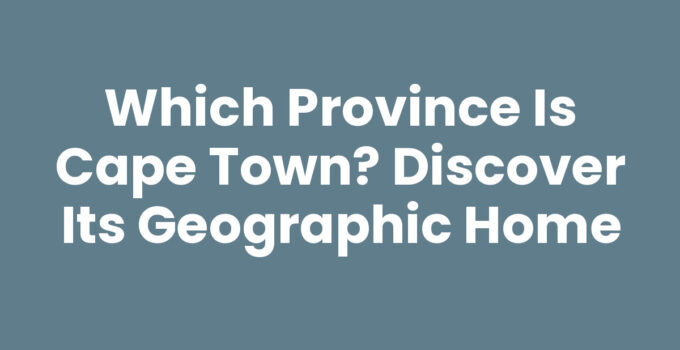When it comes to South Africa’s rich tapestry of cities and climates, Cape Town is undoubtedly one of the crown jewels. Known for its breathtaking landscapes, vibrant culture, and rich history, Cape Town attracts millions of tourists each year. However, many people are often curious about the specific province it belongs to. In this comprehensive guide, we will delve into ‘Which Province Is Cape Town?’ and explore its geographical significance, culture, and much more.
Which Province Is Cape Town:
Cape Town is situated in the Western Cape province of South Africa. As one of the country’s three capital cities, it serves as the legislative capital, where Parliament convenes. The Western Cape is renowned for its stunning natural landscapes, including Table Mountain, the Cape of Good Hope, and beautiful beaches along the Atlantic Ocean.
Beyond its natural beauty, the Western Cape is a melting pot of cultures and history. Cape Town, in particular, has a blend of various influences, including indigenous African, European, and Asian cultures. This has resulted in a rich culinary scene, diverse festivals, and an array of languages spoken within the city, including Afrikaans, English, and Xhosa.
Geography of Cape Town: Geographically, Cape Town is located at the southwestern tip of the African continent. The city is flanked by the Atlantic Ocean to the west and the iconic Table Mountain to the east. This unique positioning makes Cape Town not only a popular tourist destination but also a hub for researchers and scientists who explore its biodiversity.
Cape Town enjoys a Mediterranean climate, characterized by warm, dry summers and mild, wet winters. The coastal location contributes to its mild temperatures, creating an inviting atmosphere for both residents and visitors.
Recommended Guide: Discover Seaforth Beach Cape Town: A Hidden Coastal Gem
Exploring the Attractions of the Western Cape
The Western Cape is bursting with attractions that cater to various interests. From outdoor adventures to cultural experiences, here are a few must-visit locations:
- Table Mountain: An iconic natural wonder, offering stunning views and various hiking trails.
- Robben Island: A World Heritage Site and museum, notable for its historical significance as the prison where Nelson Mandela was held.
- Wine Regions: The Cape Winelands, including towns like Stellenbosch and Franschhoek, are famous for exquisite wines and picturesque vineyards.
- Cape of Good Hope: A rugged and scenic reserve, ideal for nature lovers and those looking to explore unique wildlife.
Visiting these attractions not only brings tourists face-to-face with the beauty of nature but also opens the door to learning about the diverse histories and cultures that shape the Western Cape.
Related Guide: Explore the Charm of Spar Kensington Cape Town Today
The Cultural Landscape of Cape Town
Cape Town is home to a vibrant culture that reflects its diverse population. Festivals, art, music, and food form the foundation of this city’s identity. Here are some cultural highlights:
- Food Tours: Cape Town’s culinary scene is influenced by its multicultural heritage. Visitors can embark on food tours to explore local cuisine, from traditional street food to gourmet dining experiences.
- Art and Festivals: The city hosts various art festivals throughout the year, showcasing local artists and musicians. Events like the Cape Town International Jazz Festival are not to be missed.
- Historical Sites: Sites such as the District Six Museum tell the story of the city’s apartheid past, ensuring that the lessons of history are not forgotten.
The blend of cultural experiences available in Cape Town fosters an environment where visitors can learn, engage, and appreciate the city’s rich history and cultural diversity.
Further Reading: Discover the Excitement of Trampoline Parks Cape Town
Conclusion
In conclusion, Cape Town is nestled in the Western Cape province of South Africa. With its unique geographical location, it serves as a focal point for tourism, culture, and history. From the majestic Table Mountain to the thriving art scene and rich culinary culture, Cape Town is a destination that offers something for everyone. Whether you are traveling for leisure or seeking to learn more about its historical significance, the Western Cape and its capital remain a must-visit destination.
Recommended Guide: Explore Vacancies At University Of Cape Town: Your Guide
Frequently Asked Questions
What is the capital province of Cape Town?
Cape Town is the capital city of the Western Cape province.
What makes Cape Town unique?
Cape Town is known for its stunning landscapes, rich history, diverse cultures, and iconic landmarks like Table Mountain.
What are the best attractions in the Western Cape?
Top attractions include Table Mountain, Robben Island, the Cape Winelands, and the Cape of Good Hope.



